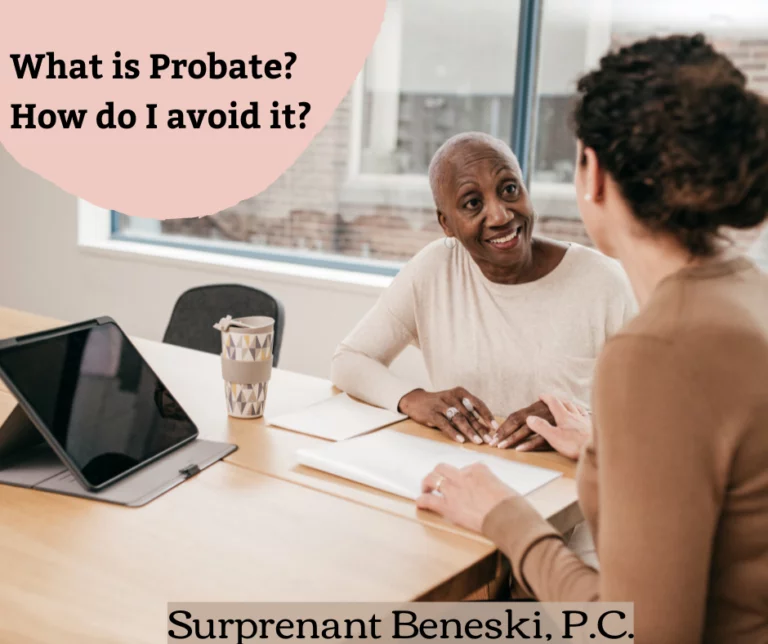Probate is a court process to settle an estate after someone dies. There are two types of probates. The first is interstate probate. For example, if someone dies without a Will, then they are “intestate” and a court has to decide what happens to their property. The second type is testate probate. “Testate” probate is used when someone dies with a Will. In both cases, a court needs to make sure that all taxes are paid, all creditors are paid, and all potential heirs have an opportunity to come forward.
What Probate Means
We get the word “probate” from the Latin word, probate, which means to test or prove. The English word “probe” is also derived from its Latin sister, probate. So, probate means to test or prove an estate.
- When you die with a Will, the court will prove the Will by determining its validity and accepting any challenges from the heirs.
- When you die without a Will, the court will prove that you died without a Will and allows any heirs to come forward to provide the court with a Will.
Probate begins by filing a petition for probate. The petition is a document asking the court to officially open probate and appoint you as the administrator.
How Long Does Probate Take?
After you file your petition, it usually takes two months before the court can make any decisions regarding your petition. During this time, heirs or other persons can object to the petition.
Typical objections include:
- the Will is not valid
- there is another more recent Will
- someone else should be appointed administrator
- an heir should be added or removed from the estate
After the court approves your petition, there is a 4-6 month waiting period for creditors to make claims. If a creditor makes a claim, the court needs time to decide whether to pay the claim, how the claim will be paid, and who will pay it.
Next, you file an accounting with the court after you pay all claims (or if no one files a claim).
The accounting can be tricky, time-consuming, and taxing. It typically takes about a month to collect all the receipts and balance the accounting. Once you complete the accounting, the court needs time to review it and approve it. This process can take another two to three months (especially if there is a problem).
After the court approves the accounting, you can file a petition for final distribution. Although, it is frequently a good idea to file the accounting and petition for final distribution together.
The petition for final distribution asks the court to approve the plan for distribution. If there is a Will, the plan for distribution is stated in the Will. If there is no Will, then the court follows the State’s plan of distribution.
Reasons to Avoid Probate
- No privacy – Your financial affairs will be made public. Your nosy next-door neighbor can go down to the courthouse and view all the documents filed with the court. Notice of the probate will be published in a local newspaper to alert all creditors.
- Lengthy – Beneficiaries cannot receive assets until the probate process is concluded. The probate process can take months to years to be completed depending on multiple factors.
- Costly – Professional fees and court costs can add up to a significant sum. Every dollar spent on probate reduces what is passed on to beneficiaries.
- Disputes – The validity of a Will may be challenged by any “interested” person. This may potentially invalidate the Will in question.
Two Ways to Avoid Probate
Not all assets must go through the probate process and some can immediately be passed on to beneficiaries.
Common non-probate assets include:
- trust property
- jointly owned property
- designated beneficiaries of life insurance proceeds
- funds held in a “payable on death” account
As the creator of a Revocable Living Trust, you can name yourself as the Trustee of the Trust and name someone close to you as the successor Trustee. The Trust, created and activated during your lifetime, will continue to be controlled by you and allows assets to be easily transferred in and out of the Trust. Upon your death or incapacity your successor Trustee will take over automatically.
Even though a trust can be equally complicated, dealing with errors in administering a trust is easier than dealing with errors during the probate process. For instance, the probate code, a rigid set of rules, governs the entire probate process. Whereas a trust can be handled informally and problems can be resolved relatively quickly. Creating a good living trust is actually the result of a series of specialized planning choices. That is why it is a good idea to work with an experienced and knowledgeable estate planning attorney to draft this kind of estate planning tool. When choosing an attorney for this kind of thing, you should look for an attorney who focuses exclusively on estate planning. You do not want an attorney who just does estate planning “on the side.”
At Surprenant & Beneski, PC, we specialize in Estate Planning & Elder Law. We welcome the opportunity to work with you to create an estate plan and/or help you through the probate process.
©Surprenant & Beneski, P.C. 35 Arnold Street, New Bedford, MA 02740, 336 South Street, Hyannis MA 02601 and 45 Bristol Drive, Easton MA 02375. This article is for illustration purposes only. This handout does not constitute legal advice. There is no attorney/client relationship created with Surprenant & Beneski, P.C. by this article. DO NOT make decisions based upon information in this handout. Every family is unique and legal advice can only be given after an individual consultation with an elder law attorney. Any decisions made without proper legal advice may cause significant legal and financial problems.
